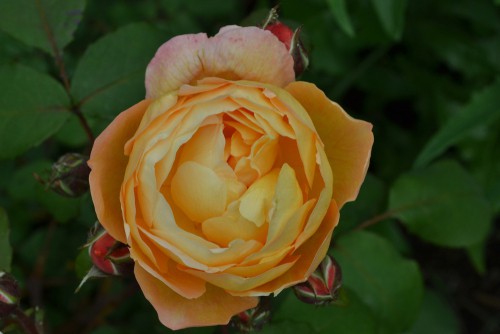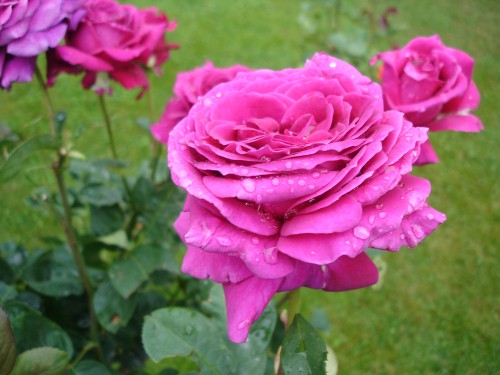Last updated on April 3rd, 2022
Our site is reader supported, this means we may earn a small commission from Amazon and other affiliates when you buy through links on our site.
If you have a small area like a patio, balcony, or terrace and you want to grow roses, rest assured there are plenty of varieties that thrive in pots and containers. The key to your success is to find a variety that is smaller and match it to the existing space you have, finding a pot or container that is the appropriate depth for the root system.
Finding the Container
Most of the roses that you grow in pots and containers can grow upwards of 45-60cm high if the container is 60cm. Based on these measurements, you ideally want to purchase a container that is at least 60cm in size so that it can accommodate the roots because they also tend to have deep root systems. That being said, you can choose to grow a single rose bush in a single pot, or a few rose bushes in a larger container. If you are growing more than one rose, keep them 45cm apart so that you can enjoy their natural bushy shape without cutting off the air circulation. You will find that a longer trough is better for this.
The material the pot is made from should be something heavy, especially if you are growing a larger variety. Remember that roses in pots (or containers) will still grow quite tall and needs to be protected from the wind. If you choose a thin plastic material for the container it is more likely to be blown over.
Choosing the right compost
Inside the pot, you should ideally be using a mixture of potting compost that is suitable for roses specifically. Most garden centres and nurseries will sell this but you can also buy rose compost online and have it delivered directly to your door. Fertiliser can be added when you plant your roses, as well as right after pruning, and again in summer after the first flush of flowers.
Pruning
When it comes to pruning, whichever of these 8 varieties you choose you should prune them the same as you would any other roses, getting rid of any dead or diseased branches immediately, removing suckers, cutting back any growth that is rubbing across other branches or otherwise inhibiting the overall shape. You can also deadhead the spent flowers after the first flush in order to encourage a second flush of roses.
Most patio roses live between 5 and 7 years in containers, so once your patio rose has reached its prime, you would do well to replace it with another one of the options on this list.
Below are the eight of the best varieties for your pots
1. Patio Rose ‘Letchworth Centenary’
This bush rose has peachy pink flowers that produce a musky fragrance. They grow in rounded, bushy forms. The height and spread are often equal in size, averaging 60cm once fully established.
2. Patio Rose ‘Happy Days’
If you want semi-double flowers, this is a great variety to choose. They are beautiful and they grow in a single, dense mound that is slightly bigger. At full maturity, it reaches a height of around 60cm with a full spread of around 80cm.
3. Patio Rose ‘The Queen’s London Child’
If you are more interested in scent, this is the one to choose. It is the most highly scented patio rose out there. It has a great structure with large flowers. It reaches heights of 60cm with a spread of 40cm.
4. Floribunda Rose ‘Red Hat Lady’
For something less heavily scented, you can opt for the ‘Red Hat Lady’ floribunda rose. These flowers are very lightly scented and they produce dense carpets of flowers offset by their bushy shape. If you continue to feed these roses throughout the season they will reflower regularly so you will receive more than one flush of flowers. Once fully established they will reach a height of 60cm and a spread of 50cm.
5. Groundcover Rose ‘Suffolk’
This is a repeat flowering rose that, if you deadhead and fertilise correctly will continue to produce regular flowers throughout the spring and summer. The flowers start off with a scarlet colour and these give way to orange-red hips, giving something visually appealing all the way through into the winter season. As they are really groundcover roses they tend to trail over the pots rather than create a large and upright bushy shape.
6. English Shrub Rose ‘Lady Emma Hamilton’

If you like blooms that are unique in colour, this rose offers a coppery shade that is quite unusual. The leaves also stand out in their dark bronze colour. The scent is that of a fruit tree so it gives you a slightly different appeal compared to the traditional musk fragrance of roses.
7. Procumbent Rose ‘Flower Carpet Coral’
This variety is aptly named because the flowers are rich with coral pink colours and look like a large carpet. The flowers produced are big in size and the single flowers attract pollinators like bees very well.
David Austin Rose ‘Gertrude Jekyll’

Finally, if you want something classic, these are the varieties to choose from. The David Austin variety gives you those classic rosebuds that open up to the perfect rose filled with petals. These ‘Gertrude Jekyll’ roses produce flowers that have the prettiest pink shade. The scent is the quintessential fragrance, very exquisite, and perfect for a small seating area.
Rest assured, no matter which of these you choose, you can enjoy something beautiful year after year and once the flowers have lived out their lifespan, you can pick another variety from this list to replace them.


